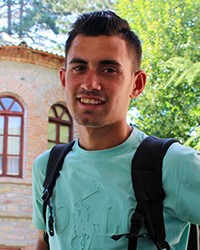Albanian in Slovenia

Photo Source:
Anonymous
|
Send Joshua Project a map of this people group.
|
| People Name: | Albanian |
| Country: | Slovenia |
| 10/40 Window: | No |
| Population: | 6,500 |
| World Population: | 5,797,000 |
| Primary Language: | Albanian, Gheg |
| Primary Religion: | Islam |
| Christian Adherents: | 30.00 % |
| Evangelicals: | 0.50 % |
| Scripture: | New Testament |
| Ministry Resources: | Yes |
| Jesus Film: | Yes |
| Audio Recordings: | Yes |
| People Cluster: | Albanian |
| Affinity Bloc: | Eurasian Peoples |
| Progress Level: |
|
Introduction / History
Albanians are probably descendants of the Illyrians, who were the original inhabitants of the western Balkan Peninsula. In the sixth century, migrating Slavs began to settle on Illyrian territory and pushed the Illyrians into what is present-day Albania. For nearly five centuries the territory we now know as Albania was part of the Turkish Ottoman Empire. In 1912 Albania became an independent country.
Before the changes introduced by the communist regime in the 1940s, the Albanians were tribal people who lived in extended family units called fis. The fis had many old traditions, such as the vendettas, or "blood feuds," which often lasted for several generations. For protection during these feuds, families lived in fortified stone buildings called kulas. The ground floor of the kula was built with small slits rather than windows, while the upper floor had windows that could be closed.
The Albanians are divided into two major groups, the Gheg and the Tosk, according to which Albanian dialect they speak. The Gheg live north of the Shkumbin River, while the Tosk live south of the river. The two dialects differ slightly in vocabulary and pronunciation. In the 1950s it was decided that the Tosk dialect would be used in all Albanian publications since it was the one most widely spoken in Albania. In addition to differences in dialect, the Gheg and the Tosk also have social differences. The Gheg are a very stern and courageous people; while the Tosk are known to be friendly, lively, and talkative.
The collapse of Albania's communist regime in 1991 brought on numerous traumatic and rapid changes in Albania, leaving the people with an identity crisis. The people, who had been held in darkness about the outside world, were shocked to discover that they were among the poorest in Europe. Hurt, angry, and confused, they are working their way out of poverty. By the mid 2020s Albania was the fifth poorest country in Europe, but their economy was improving as they took advantage of their national resources.
The economy still didn't sustain the population, and some resorted to crime. Efforts to curb crime through religious teaching had a limited effect. Many migrated to countries like Slovenia.
What Are Their Lives Like?
Albanians have proven themselves to be excellent soccer players in Slovenia. Albanians are known for their ability to learn the Slovenian language, though they usually keep to themselves. Many live in poverty.
What Are Their Beliefs?
Centuries ago, many Albanians were converted to Islam by the Ottoman Turks. However, they practiced a type of "folk Islam," which embraced occult practices such as praying to the dead, seeking cures for sickness, and praying for protection from spirits and curses. Because of the hostility towards religion they experienced between 1946-1991, some Albanians remain atheistic. Some are Orthodox or Catholic.
What Are Their Needs?
The Albanians in Slovenia need educational opportunities so they can thrive and earn a good living.
Prayer Points
Pray for the Holy Spirit to birth a cascading discipleship movement among the Albanians in Slovenia for God's glory.
Pray that Bibles will be effectively distributed to Albanians in Slovenia that will have a strong spiritual impact.
Ask God to use the small number of Gheg believers to share Christ's love with their people. Pray that these believers will walk in a way worthy of the Lord, so they can draw others to him.
Pray for a movement to Christ among Albanians to spread far and wide.